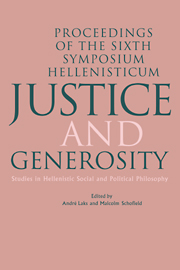 Justice and Generosity
Justice and Generosity Book contents
- Frontmatter
- Contents
- Preface
- Introduction
- PART I POLITICAL PHILOSOPHY: DEVELOPMENT AND TRANSFORMATION
- 1 Polybius' applied political theory
- 2 The statesman and the law in the political philosophy of Cicero
- 3 Aristotelian political theory in the Hellenistic period
- 4 Oikonomia in Hellenistic political thought
- 5 The Cynics and politics
- PART II THE ETHICAL FRAMEWORK OF POLITICS AND SOCIETY
- Bibliography
- General index
- Index of Greek and Latin words
- Index of ancient names and philosophical schools
- Index of passages
3 - Aristotelian political theory in the Hellenistic period
from PART I - POLITICAL PHILOSOPHY: DEVELOPMENT AND TRANSFORMATION
Published online by Cambridge University Press: 15 October 2009
- Frontmatter
- Contents
- Preface
- Introduction
- PART I POLITICAL PHILOSOPHY: DEVELOPMENT AND TRANSFORMATION
- 1 Polybius' applied political theory
- 2 The statesman and the law in the political philosophy of Cicero
- 3 Aristotelian political theory in the Hellenistic period
- 4 Oikonomia in Hellenistic political thought
- 5 The Cynics and politics
- PART II THE ETHICAL FRAMEWORK OF POLITICS AND SOCIETY
- Bibliography
- General index
- Index of Greek and Latin words
- Index of ancient names and philosophical schools
- Index of passages
Summary
It is a cliché that, in the moral and political philosophy of the schools which formed in the Hellenistic period, the polis loses the central role which it has for Plato and Aristotle. Various explanations of this fact have been put forward, mostly in terms of the sociology and politics of the period. None of these seem to me convincing, but I shall not be concerned with them here, because my concern in this chapter is rather with one set of philosophical arguments which reflect this shift. My focus is further narrowed in that I shall not be concerned with the new Hellenistic schools themselves, but rather with the fate, in the Hellenistic period, of Aristotle's moral and political philosophy, one which in its original version clearly does make the polis, and the kind of relationships which are special to it, important in ethical thought, and which thus contains a robust ‘political philosophy’, one which focuses on questions of equality, justice and authority within a definite unit, the city-state.
Not only does the Aristotelian corpus include an extensive work of political philosophy: Aristotle's ethical theory gives it a specific place. Any ethical theory has to answer the question, ‘What are our obligations to others, and how do they differ with our different relations to others?’ Ancient theories, which are eudaimonistic in structure, pose the question in terms of the extent to which the interests of others have to be taken account of for the agent to achieve her own final end, happiness.
- Type
- Chapter
- Information
- Justice and GenerosityStudies in Hellenistic Social and Political Philosophy - Proceedings of the Sixth Symposium Hellenisticum, pp. 74 - 94Publisher: Cambridge University PressPrint publication year: 1995
- 16
- Cited by


